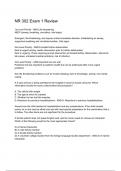Exam (elaborations)
NR 302 Exam 1 Review/ NR302 Exam ( 2024/ 2025) Questions with Verified Answers |100% Correct| Grade A+ - NR 302 / NR302
- Course
- NR 302 / NR302
- Institution
- Chamberlain College Of Nursing
NR 302 Exam 1 Review/ NR302 Exam ( 2024/ 2025) Questions with Verified Answers |100% Correct| Grade A+ - NR 302 / NR302
[Show more]



